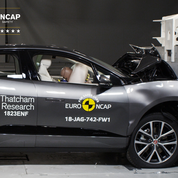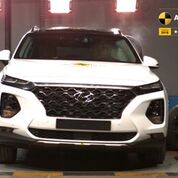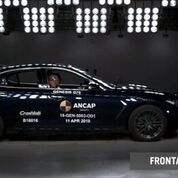INDEPENDENT SAFETY AUTHORITY, ANCAP, has released its latest round of findings, announcing that the Ford Focus, Hyundai Santa Fe, Genesis G70 and Jaguar I-Pace have all been awarded five stars.
The new Ford Focus stood out for its excellent rating for Child Occupant Protection, partly as a result of its forward and reverse auto braking systems.

The electric-powered Jaguar I-Pace was also awarded five stars for all variants. The outstanding feature of the I-Pace is its use of an external airbag, increasing protection for pedestrians.
In another safety initiative, Hyundai’s Santa Fe incorporates a child occupant detection feature to alert drivers when leaving the vehicle if a rear seat occupant is detected. Following many reports of children being inadvertently left in vehicles by distracted drivers (and this is particularly relevant for people, such as grandparents, who don’t necessarily carry children in their cars on a daily basis) this will reduce the incidences of babies or young children being left in unattended vehicles.

However, it wasn’t all good news for the Santa Fe. ANCAP’s engineers identified an issue with the deployment of the curtain airbag in Santa Fe models fitted with the panoramic sunroof. On deployment, the airbag was found to tear and a portion of it caught on the upper belt anchorage, increasing head injury risk in side impact and oblique pole tests. Hyundai has responded by issuing a national recall to remedy the problem and introduced a production change for future models.
The Santa Fe was also criticised for lacking top tether anchorages in the seven-seat model, making the third row unsuitable for the installation of child restraints and therefore unable to be used to carry young children. This is an anomaly in the Australian market, that specifies top tethers when almost no other market in the world has required them, meaning manufacturers must produce cars and child seats specifically to meet Australian requirements, something that many (particularly child seat manufacturers) have decided is uneconomic.

Another vehicle to attain five-star rating in the latest round of testing is the Genesis G70. This is somewhat ironic in light of a recent report that Hyundai (the parent company of Genesis) is considering abandoning involvement in ANCAP testing. Hyundai sells around 100,000 vehicles annually in Australia, making it the third most popular brand.
The company claims, not without some justification, that the cost of complying with voluntary ANCAP safety standards is becoming too expensive. Even though cars must pass mandatory crash tests to be sold in Australia, ANCAP requirements are more onerous. ANCAP continues to demand more safety equipment before a vehicle can be issued with a five-star rating, such as autonomous emergency braking, for example. With pricing for entry level cars under increasing pressure, such additional equipment inevitably pushes prices higher. Hyundai COO Scott Grant suggested that meeting the more challenging standards could raise the price of entry-level cars and make them unattainable for many buyers. It is already clear that many manufacturers omit some safety equipment from entry-level cars, to maintain an appealing headline price, while offering safety options or packages at additional cost for buyers to include if they wish. As Scot Grant observed, “It’s no good having the most expensive, brilliant, high-tech, perfectly safe car that no-one can afford to buy.”
If Hyundai does decide to turn away from ANCAP it would be a major blow for the authority.
Since the end of local motor vehicle production, we have often questioned the need for a local testing authority, especially since many cars (especially luxury, high performance and sports cars) are not submitted for local testing. In fact, in the same announcement ANCAP released regarding the latest cars to qualify for ANCAP’s five-star rating, it also announced that Euro NCAP had issued ratings for the Audi Q3, Peugeot 508, Volvo V60/S60 and Jeep Wrangler, adding a rider that “the applicability of these results to Australasian-specified models will be determined in conjunction with local vehicle launches in 2019.” The release went on the state that a rating for the European BMW X5 had also been issued, but “a rating for Australasian-specified X5 models is yet to be determined as BMW has not provided access to a vehicle for local assessment.” As a consequence, the X5 remains unrated in Australia and New Zealand.
